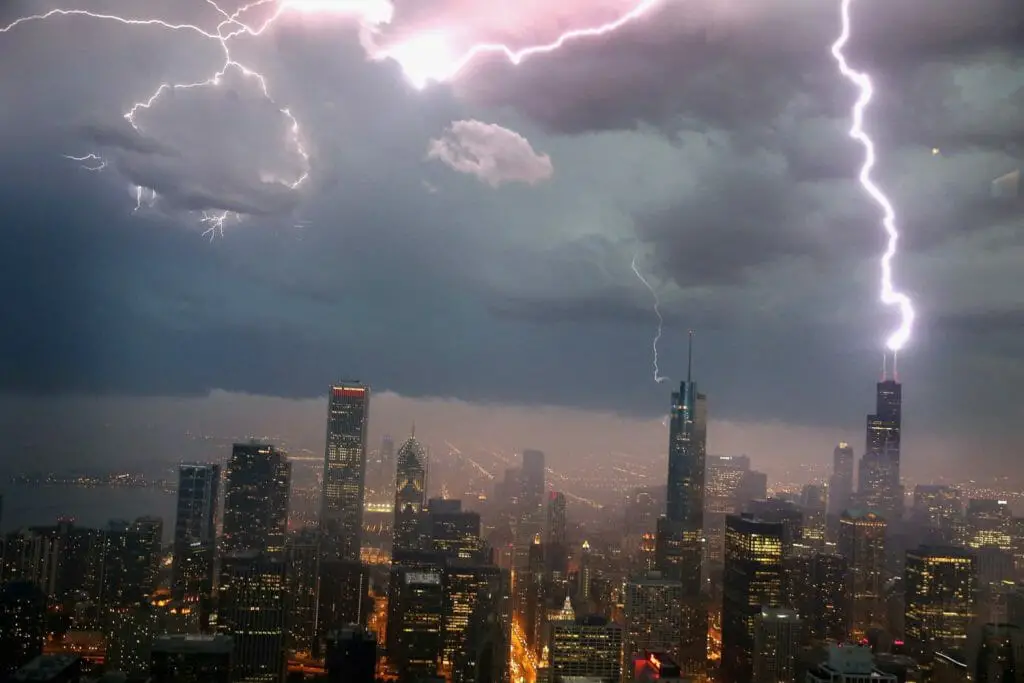When it comes to showering during a thunderstorm, in general, according to the National Weather Service, the chances of injury are extremely small. Yet, relatively specific risk points are attached to being in the shower if your home is struck by lightning. If possible, avoid showering during a thunderstorm, but know that the chances of injury are very low.

Facts Of Showering During A Thunderstorm
- Lightning can strike three to 10 miles away from a storm.
- Lightning is unlikely to occur if it rains less than 4 inches per hour.
- If you hear thunder, you should get into a sturdy building or a hard-to-reach place to avoid risks from lightning.
Generally, you should wait 30 minutes after the last lightning strike before getting in the water, but this depends on a few other factors, like the time of day and how close you are to the storm. It’s best to play it safe.
The best thing to do for lightning safety is to wait till you have stopped hearing thunder to take your shower or bath; that way, you will be in the clear.

The Damage Lightning Can Cause to You
Even though it is rare, people get hurt or killed by lightning strikes annually.
A list of injuries that can be sustained during a lightning storm, please find them below :
- Burns: Lightning strikes can cause severe burns on the skin, ranging from minor singed hair to deep third-degree burns.
- Cardiac arrest: Lightning strikes can cause the heart to stop or malfunction, leading to cardiac arrest.
- Trauma: Lightning strikes can cause blunt force trauma, resulting in fractures, dislocations, and other internal injuries.
- Neurological injuries: Lightning strikes can cause brain injury, seizures, memory loss, coma, and other neurological issues.
- Respiratory injuries: Lightning strikes can cause breathing problems and lung damage.
- Hearing loss: Lightning strikes can cause temporary or permanent hearing loss.

Although potentially fatal, lightning does not always cause immediate death. Lightning can kill people in several ways. It causes heart failure on impact or blunt impact trauma from getting thrown to the ground.
Also, impalement from a tree branch or other object delayed death due to burn-related injuries, anoxia (lack of oxygen to the brain), or neurological damage. (1, 2)
When lightning strikes the earth, it releases a large amount of energy. This charge is felt as a strong electrical shock when it rides along the skin and into the body. According to the National Weather Service, lightning injuries depend on the intensity of electricity that passes into the body.
Can Lightning Travel Across Water?
According to the National Weather Service, a lightning strike near your home could send a surge of electricity into anything with metal in it—including your pipes. While this is rare, unplugging any appliances or electronics is always the best bet.
Water is generally an excellent conductor of electricity. It can carry electrical currents from lightning, as well, experts say. Hence, it turns out that showering in a thunderstorm is dangerous for several reasons.
Some Lightning Safety Tips About Shower Lightning Storm
While it is generally accepted that showering during a thunderstorm carries more risk than necessary, both for you and your plumbing, the reasoning isn’t all the same. There are multiple opinions and lightning safety tips on keeping yourself safe while in the shower during a storm.
- Lightning can hit the same place twice, mainly if the striking point is high, pointed, and metallic. Some properties suffer strikes more than a dozen times a year. Simply put, your safest move during a thunderstorm should not be to run to the spot of the most recent impact, as it could strike again at or near the same area.
- It’s important to remember that you are safest in the interior of a building. A person standing in an open space is putting themselves at risk for a direct lightning strike. When lightning strikes, it always seeks out the path of least resistance.
- The metal pipes, air conditioning equipment, and electrical components near your home’s roof are vulnerable. Even if you’re in a house or building with lightning rods, they may not offer complete protection because many strikes occur between the ground and rooftops.
- Let’s talk about the worst-case scenario. Even if your car’s rubber tires and exterior have a negative charge, you’re less likely to attract lightning. It doesn’t mean that you’ve silenced the punch of a thunderstorm. Though rubber is not an excellent conduit for electricity, it can provide some protection from lightning strikes.
Get To Know Lightning
- Lightning strikes the Earth around 100 times per second.
- Lightning can occur during thunderstorms and in the absence of thunder.
- A lightning bolt can reach temperatures up to 50,000 degrees Fahrenheit, about five times hotter than the sun’s surface.
- Lightning can travel horizontally for several miles before striking the ground.
- Lightning strikes can cause fires, damage buildings, and cause power outages.
- A thunderstorm is required to form lightning; The storm causes charges to build up in the clouds, and lightning occurs when the charges are released on the ground.
- The rapid heating and expansion of air near a lightning strike cause the sound of thunder.
- Lightning strike victims have a high chance of survival if given immediate medical attention.
- The National Weather Service advises people to stay inside a building or a car and avoid open fields, hilltops, and water bodies during a thunderstorm.
- Rubber-soled shoes and a rubber mat do not protect you from being struck by lightning; a substantial, fully enclosed building provides the best protection.
References
(1) anoxia – https://www.healthline.com/health/anoxia
(2) neurological damage – https://www.hopkinsmedicine.org/health/conditions-and-diseases/neurological-disorders

